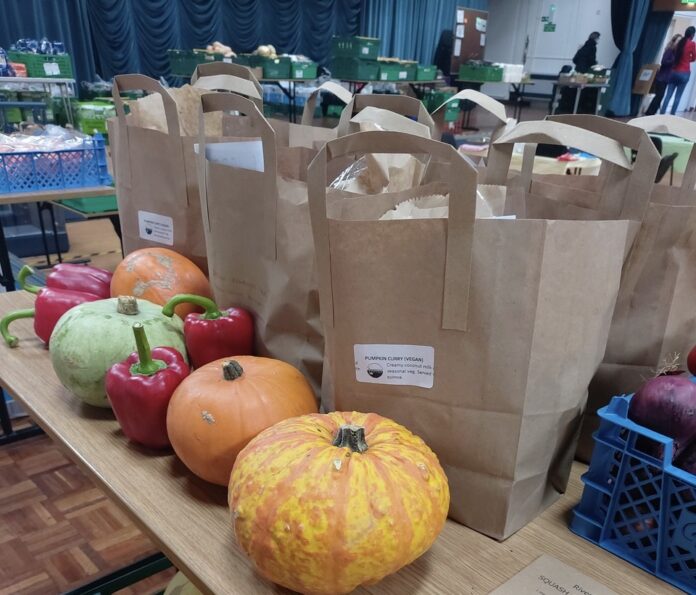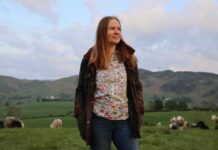Community food project Cherwell Collective has received international recognition for its work to stop food waste and feed communities.
Cherwell Collective’s “Live, Learn, Eat, Grow” is the only project from the UK to win the €10,000 prize and was among 23 grass roots and citizen projects from across the EU to be recognised for their outstanding contribution to fighting COVID-19 and its disastrous consequences.
The project was founded at Exeter Hall in Kidlington by Emily Connally who received the award as one of the entries focusing on the theme of food supply and assistance to vulnerable groups by supplying food rations, such as freshly-cooked food or fresh fruit and vegetables, often combining it with offering additional support services for everyday life.

The primary target groups were the elderly, especially those living alone, the homeless, families in need, minorities, migrants and refugees.
“I am honoured to receive this prize on behalf of the hundreds of people and organisations who have helped make this project possible”
Cherwell Collective runs three interconnected core projects. Cherwell Larder delivers supplies to some 600 people each week locally and feeds more than 1000 people a week, working with the likes of Thomas Franks and Oxford Food Bank.
Born out of produce shortages and supply-chain problems, Harvest @ Home provides basic garden supplies and guidance for people to grow their own food. Climatarian Kitchen offers cooking courses, meal kits and ready meals made from surplus food. Meal kits include flexible recipes that help build people’s confidence in the kitchen. Since July 2020, the initiative has supplied 100 households each week.

Receiving the prize this morning at an online ceremony, Emily said: “I am honoured to receive this prize on behalf of the hundreds of people and organisations who have helped make this project possible. This prize gives instant international credibility that could create local jobs and, in the long term, will empower the sustainable redevelopment of our community.”

Focusing on waste reduction, education and outreach, Cherwell Collective is helping make its community more sustainable and better prepared for a post-COVID future.
The EESC, an advisory body representing Europe’s civil society at the EU level, selected Cherwell Collective as the best UK candidate for the Prize, feeling that its entry stood out as a shining example of remarkable solidarity and civic responsibility during the COVID-19 crisis.
Since the beginning of the pandemic in March, the Oxford-based not-for-profit company has supplied food and other provisions to many residents in need. Instead of simply mitigating food and supply shortages, it devised actions to teach people how to grow their own food and to reduce waste by learning how to make the best use of all surplus foodstuffs. Through education and empowerment, people become more independent and self-sufficient.

With “Waste not, want not” as its unofficial theme, Cherwell Collective hopes its forward-thinking approach will help reduce food poverty and increase well-being after the crisis.
Presenting the prizes, the EESC’s vice-president for communication, Cillian Lohan, said:
“The EESC has repeatedly stressed that solidarity and targeted shared action are key to surviving such a pandemic. The only effective response to a crisis such as this pandemic is to act quickly, decisively, and together. There are lessons here for dealing with other crises whether they are social, economic or environmental.
“Civil society has been at the forefront of all solidarity actions and without their help on the ground, the price paid for this pandemic would be much higher. All the projects we received are proof of selfless citizen and grassroots engagement, showing the contribution of civil society in this fight to be enormous. With this prize, we are acknowledging the people and organisations making a difference in these unprecedented times. It is an honour to be able to celebrate together.”

The winners were selected from a total of 250 applications submitted by civil society organisations, individuals and private companies. All of the projects had solidarity as their driving force and displayed creative and effective ways of rising to the often-daunting challenges posed by the crisis.
Emily added: “I am deeply grateful to each and every one of our volunteers for their support, time, energy, ideas, and encouragement in this process. I believe we have made the foundation of a sustainable resource to see our community, through what will be a very long and difficult economic and social fallout from COVID and Brexit. It has taken an incredible amount of work and faith and I am incredibly proud of all of us for building something beautiful out of a worldwide nightmare.”
SARAH EDWARDS














